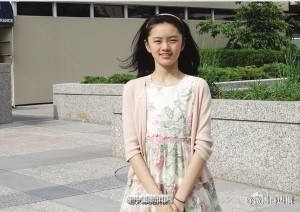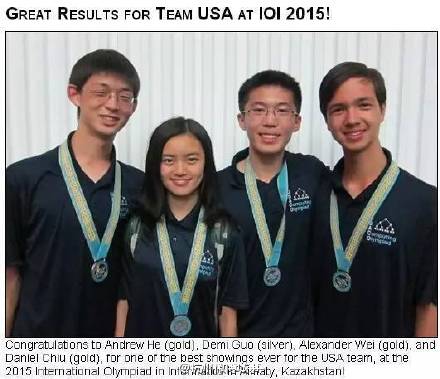Reports of an ordinary girl named Guo Wenjing from Hangzhou getting an early admission to Harvard University became big news on Chinese social media this week. The news created commotion amongst Chinese netizens for various reasons: first for the fact that a Hangzhou high school student was admitted to Harvard, and then for the fact that the story was partially untrue.
According to Qianjiang Evening News (钱江晚报), Guo Wenjing gained an early admission to Harvard with her talent in programming, and excellence in various fields. In 2014 and 2015, she won gold two times at the Olympiad in Informatics in the US. She was invited by MIT (Massachusetts Institute of Technology) to participate in a programming tournament and won the second prize. Apart from her academic achievements, Guo has also taken up sailing and skiing. In addition, she attended summer schools of well-known universities such as Harvard and Berkeley.
A number of major state media, including CCTV News (央视新闻) and People.com (人民网), posted about Guo’s admission on their Weibo account. They quoted the secretary of Harvard in China, who praised Guo: “Her computer skills are as excellent as any top American female programmer of her age, she got full marks in five subjects in the AP [Advanced Placement] exams, she speaks fluent English, and she is beautiful. She is almost perfect!”
Guo’s admission caught the attention of netizens, and the topic “High school girl’s early admission to Harvard” (#高三女孩被哈佛提前录取#) soon became trending on Sina Weibo. Thousands of users commented on the topic. Some complimented Guo on her achievements, calling her “the pride of China”, while others pointed out that China once again was sending its top talents abroad, and that Guo would “get a green card and then contribute to building up a better US”.
However, the next day, netizens exposed how Chinese major media outlets had left out some important information about Guo. Shibugui, the president of the Global Leaders Lab, revealed on his Weibo that Guo actually is an American citizen and that both of her parents graduated from MIT. Her father is the chairman of a publicly held company. He writes: “The media did not mention her nationality, and made her look like Cinderella. They sensationalized the news.”
The topic then became trending again, this time under the hashtag of “Harvard girl’s truth” (#哈佛女孩真相#), receiving a lot of attention on Weibo.
“It’s a good thing that the Chinese media is trying to publish positive things, but please let them do thorough research because Chinese netizens are smart,” says Weibo user Echo.
The majority of Weibo users believe that Guo is an excellent student with great talents, but say that her success should not be glamorized. A user called “Dragon to the Sky” says that family background has a huge influence on one’s education: “I don’t think we can learn from her case. She was born in the US and raised by PhD parents. Her parents are probably more intelligent than our teachers. For ordinary Chinese, we have to fight for better education resources through continuous exams and competitions. So, CCTV and People.com, what are you trying to say by posting this news? ”
“When will Chinese media stop twisting the truth to make news?” user “JL” says: “They always make up these positive cases, it’s been enough! It seems like they want to encourage children from poor families to study harder, but the reality is that children from ordinary families don’t have the opportunity to attend summer school at Harvard. Do you think children can have hobbies like sailing and skiing just by working hard? Are you kidding me?”
Dongfeng Paiman, former reporter of Hangzhou Newspaper Group, adds: “The media made a shameless attempt to represent an American girl whose parents are PhDs as a beautiful straight-A student from an ordinary Chinese family. They hope to stimulate all Chinese parents who have big dreams for their children.”
“What they are saying seems correct,” a mother on Weibo replies: “I saved the news on my phone immediately after I read it. I wanted to share it with my son later, but my husband had already told him ahead of me. All Chinese parents would be excited over this. It’s a great example to encourage our kids!”
As Chinese netizens are fed up with untrue reports from the media, some of them try to figure out the best way to deal with this situation. User “Orz” asks: “The questions is, if it is a crime for Chinese netizens to post and repost untrue information, then what are the consequences for these public media accounts when they post these things on Weibo?”
User Chen Haiyan says: “Those who write false news should be detained for half a month. Only by that can we keep the internet clean and clear.”
By Yiying Fan
This article was published on What’s on Weibo.

